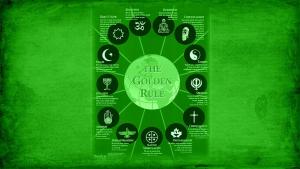
We must always be pursuing peace, especially in the midst of war: “ Great is peace, for peace is needed even at the time of war, as it is said WHEN YOU APPROACH A TOWN TO ATTACK IT, YOU SHALL OFFER IT TERMS OF PEACE (Deut. 20:10).” [1]Such peace should be authentic, one based upon reconciliation, where all sides involved in a conflict find a way to reestablish whatever justice was undermined due to war or which before it commenced, working for the betterment of all. What should not be sought is the false peace established by force, where conflict ends, not because injustice has been abolished, but because the power behind such injustice subjugates those who resisted its power. Those who seek true peace through reconciliation will find God is at work in and through their peace efforts. “Great is peace, for it is granted to those who return in penitence as it said, PEACE, PEACE, TO HIM THAT IS FAR OFF AND TO HIM THAT IS NEAR, SAYS THE LORD, CREATOR OF THE FRUIT OF THE LIPS (Isa 57:19).”[2]
Peace should always be the goal of war, and not just any peace, but a just peace, one which recognizes the dignity of all involved. Those who go to war for their own personal gain at the expense of the innocent should be resisted, but always, through just means; no one should use the evil of someone else to justify a disproportionate, indiscriminate response in return. War is hell, and even those who have a just cause end up doing all kinds of evil which will require mercy and forgiveness. This is why the only way to bring about peace is reconciliation, where all sides involved in conflict work to restore the justice which had been lost, not only in the conflict which ensued, but also what had been lost before the conflict, for injustices cause conflicts, and if they are not corrected, new conflicts will emerge.
Reconciliation, which includes penitence by those who have done wrong, has an important role in the peace-making process. This is something which wise men and women from all major religious traditions not only have learned, but have sought to put it into practice, which is why it can be and often is a theme of interreligious dialogue. That is, religions can and should come together, sharing their insight into peace and justice, working to make the world a better place instead of creating more conflicts, and in doing so, undermine the peace which they are told they should pursue. This is why the Dicastery for Interreligious Dialogue, writing to Buddhists in honor of Vesak (the festival which celebrates the birth, enlightenment, and passing of Siddhartha), said that Christians and Buddhists have many principles in common which should help them come together and work for the common good:
The noble teachings of our respective traditions, and the exemplary lives lived by those whom we revere, bear witness to the abundant benefits of reconciliation and resilience. When forgiveness is sought, and broken relationships healed, those who were estranged are reconciled and harmony is restored. Resilience empowers individuals and communities to recover from adversity and trauma. It fosters courage and hope for a brighter future, since it transforms both victims and the perpetrators and leads to a new life. Reconciliation and resilience unite to form a potent synergy that heals past wounds, forges strong bonds, and makes it possible to meet life’s challenges with fortitude and optimism.[3]
The Dicastery noted how this truth is exemplified in both Buddhist and Christian traditions:
Buddha imparted the timeless wisdom that “hatred is never appeased by hatred in this world. It is appeased only by loving-kindness” (Dhammapada, v. 5), while Saint Paul, echoing Jesus’ call for boundless forgiveness (Gospel of Matthew 6:14), exhorts Christians to embrace the ministry of reconciliation initiated by God in Christ (2 Corinthians 5:11-21).[4]
Reconciliation requires those who have done wrong to admit their wrongs, not seek to justify them, and so work to change their ways so that they do not continue to do such wrongdoing in the future. Part of the process of reconciliation is confession, for confession requires us to engage an examination of conscience, looking deep within, discerning not only what we have done, but why we have done it. Though that discovery, we can work to overcome all bad influences, all the bad seeds in our mind, as it were, clearing them away and planting in their place good thoughts which oppose them: “Through confession you clear away the obscurations, which are the unfavorable conditions. Cultivating delight in the virtue that you have done – which is a part of rejoicing – will also increase your virtue.” [5]
One of the greatest, most powerful seeds which influence us and our way of thinking is hatred; it motivates us to harm others, giving us excuse after excuse as to why we should do so: “One’s mind finds no peace, neither pleasure or delight, nor goes to sleep, nor feels secure while the dart of hatred is stuck in the heart.” [6] To root out hate, and the vices which flow from it, we must generate love, so that love, not hate, becomes the means by which we engage others, including those who are deemed our enemies:
Cultivate love for those who have gathered to listen. Give up jealousy that fears the superiority of others; the laziness of procrastination; the dispiritedness of being tired due to explaining something again and again; praising yourself and listing the faults of others; stinginess with regard to explaining the teaching; and concern for material things such as good and clothing. [7]
This is where meditation and spiritual reading can help us, because they help us discover all the reasons why we can and should love others, and when we do that, we can use what we have learned to counter whatever bad seeds remain in our mind which encourage us to embrace hate and destruction. It is, of course, also important to act on what we learn, for that then can be said to “water” the seeds, making sure they bear good fruit. But, what is important for us here, is to see that the transformation must begin in and with ourselves: “In the same way, since I cannot control external events, I will control my own mind.” [8] Once we gain control of ourselves, once we begin to show others love, they will be motivated by our love and hopefully begin the process of changing as well, and then, when we all engage each other with love, we can truly establish a true and lasting peace. One way Buddhists do this is to consider the problem of suffering, generating a desire to see no one suffer, for the more we desire to end suffering in the world, the more we will find ourselves caring for everyone, while if we are indifferent to suffering, we will find our love for others will grow cold:
In general, if you repeatedly consider the suffering of living beings, you of course develop a simple desire to free them from suffering. However, to develop this attitude easily, strongly, and firmly, you must first cherish these beings and have affection for them. [9]
Buddhists speak wisely on the need for compassion, mercy, and love, speaking words which Christians should listen to and heed, for those words will help Christians follow Christ who told them to love everyone as themselves. Why are Christians told this? In part, because God created everyone good; everyone has an honor and dignity of their own which has been given to them by God by being made in the image and likeness of God. To ignore that dignity, to disrespect it, is to disrespect God. Thus, Christians should, like Buddhists, seek to alleviate suffering in the world, but when they cannot do that, they should at least resist returning evil for evil, that is, not make for more, and worse suffering in the world:
Therefore, since we have no reason to excuse ourselves, the man to whom God has given more than he needs should redeem his sins out of his superfluity. If a man is unable to redeem captives or feed and clothe the poor, he should not harbor in his heart hatred for anyone. Not only should he not fail to return evil for evil, but he should love his enemies and not cease to pray for them. [10]
Christians should be peacemakers, but sadly, they have a history of ignoring what Jesus said he expected from them, that is, they find all kinds of reasons too excuse themselves from the love they should have for all. Far from making the world a better place, far from being the salt of the earth, once they gain power, Christians have a history of becoming oppressors, just as bad or worse than those who oppressed them. In doing so, they undermine the peace they are meant to establish by perpetuating hate and the cycle of violence which comes from such hate:
But we pursue the opposite of what these men teach. Not only are we unwilling to love one another, but we want to hate our neighbors as enemies, not realizing, it seems, that enmity and hatred are offspring of the evil spirit. Hence, we treat them with injustice and oppress them and subject them to countless slanderous attacks, and totally bereft of love we inflict every kind of harm on them. [11]
Christians should not be warlike, promoting war or armed conflict as a good, but rather, they should know war is always an evil, even when it becomes necessary in self-defense. They should be willing to ask God for forgiveness, even when engaged in a just war, for they helps them remember that they have done evil, and so have room to make reparations when they begin reconciling with those they fought against. Christians certainly should never put their trust in arms, nor should they use war to make the world conform to their vision of it, for when they do that, they only become oppressors, ignoring the freedom and dignity of those they subjugate (which is why so-called Christian nationalism is inherently anti-Christian, as it uses violence to subjugate all those said to be in error, which can and often includes other Christians). Christians should engage others with love, working to overcome injustice, doing the least harm they can do, and they should do so by following the example of Christ, who was long suffering and freely forgave those who attacked him. That is, though it is a challenge, Christians should follow the wise words of St. Cyril of Alexandria when he said:
Indeed, it is not fitting for us, who have been chosen to contend earnestly for piety towards God, to arm ourselves with swords against our enemies. Rather, we should be longsuffering. And though some people may wish to persecute us, when reviled we bless, when suffering we do not grumble, instead we give ourselves over to him who judges justly.[12]
Christian should never become persecutors, and when they do so, they find themselves far from the teachings of the Christian faith. They can and should work to stop injustice in the world, but again, it is important they do it the right way, looking for true peace and reconciliation as the end point of any conflict. They should care about the innocents hurt in all sides of a war. They should not accept indeterminate warfare as being justified at any time at war. They must, therefore, keep love and justice, and the expectations of both, at the forefront, so that they can truly work for a better world with others. Christians and should dialogue with non-Christians, learn from them the ways of peace and love, while sharing the peace and love they have learned from Christ with others. We need the people of the world to come together, to truly work for and promote peace in the world, knowing, even if we cannot establish utopia, we can make the world better, embracing the wisdom which most religions in the world teach in regards peace, mercy, and love. Thus, we should embrace what the Dicastery for Interreligious Dialogue said, when it indicated:
Unless the deeper causes of conflicts and violence are properly addressed, the dawn of lasting peace is an illusion, for there can be no peace and reconciliation without equity and justice in political, economic and cultural life. “Forgiving and being reconciled are not about pretending that things are other than they are. It is not patting one another on the back and turning a blind eye to the wrong. True reconciliation exposes the awfulness, the abuse, the pain, the degradation, the truth” (Desmond Tutu, No Future Without Forgiveness, 218).[13]
Christians have not always lived this out. History shows they went from becoming victims to abusers when they gained power in Rome. This is not a problem for Christians alone. It is a common problem for all, because we tend not to embrace the way of reconciliation, but instead, vengeance, when we go from being oppressed to have a position of power and authority. The way of vengeance never works. It only generate fear and hatred. Love teaches us the way to overcome the cycle of violence. Religion, at its best, always promotes such love. It is time religions join together, not in belief, but in action, doing the good they all say should be done, for when they do this, they will be able to prove religion is more than the “opiate for the masses” but a true force for good in the world.
[1] Reuven Hammer, trans. and ed., The Classic Midrash: Tannaitic Commentaries on the Bible (New York: Paulist Press, 1995), 231.
[2] Reuven Hammer, trans. and ed., The Classic Midrash: Tannaitic Commentaries on the Bible, 231.
[3] Dicastery For Interreligious Dialogue, “Christians And Buddhists: Working Together For Peace
Through Reconciliation And Resilience” (5-6-2024).
[4] Dicastery For Interreligious Dialogue, “Christians And Buddhists: Working Together For Peace
Through Reconciliation And Resilience” .
[5] Tsong-kha-pa, The Great Treatise on the Stages of the Path to Enlightenment. Volume One. Trans. Lamrin Chenmo Translation Committee. Ed. Joshua W.C. Cutler and Guy Newland (Ithaca: NY: Snow Lion Publications, 2000), 98.
[6] Śāntideva, The Bodhisattvacaryāvatāra. Trans. Kate Crosby and Andrew Skilton (Oxford: Oxford University Press, 1995; repr. 1998), 50 [6.3].
[7] Tsong-kha-pa, The Great Treatise on the Stages of the Path to Enlightenment. Volume One, 64.
[8] Śāntideva, The Bodhisattvacaryāvatāra, 35 [5.14].
[9] Tsong-kha-pa, The Great Treatise on the Stages of the Path to Enlightenment. Volume Two. Trans. Lamrin Chenmo Translation Committee. Ed. Joshua W.C. Cutler and Guy Newland (Ithaca: NY: Snow Lion Publications, 2004), 31.
[10] St. Caesarius of Arles, Sermons Volume I (1-80). Trans. Mary Magdeleine Mueller, OSF (New York: Fathers of the Church, 1956), 162 [Sermon 32].
[11] St Sophronios of Jerusalem, “Homily 7: Homily on the Blessed Apostles Saints Peter and Paul (On the Fourth Day of the Nativity)” in Homilies. Trans. John M. Duffy (Cambridge: Harvard University Press, 2020), 319-21.
[12] St. Cyril of Alexandria, Glaphyra on the Pentateuch, Volume 1: Genesis. Trans. Nicholas P. Lunn (Washington, DC: CUA Press, 2018), 269.
[13] Dicastery For Interreligious Dialogue, “Christians And Buddhists: Working Together For Peace
Through Reconciliation And Resilience” (5-6-2024).
Stay in touch! Like A Little Bit of Nothing on Facebook.
If you liked what you read, please consider sharing it with your friends and family!
N.B.: While I read comments to moderate them, I rarely respond to them. If I don’t respond to your comment directly, don’t assume I am unthankful for it. I appreciate it. But I want readers to feel free to ask questions, and hopefully, dialogue with each other. I have shared what I wanted to say, though some responses will get a brief reply by me, or, if I find it interesting and something I can engage fully, as the foundation for another post. I have had many posts inspired or improved upon thanks to my readers.












